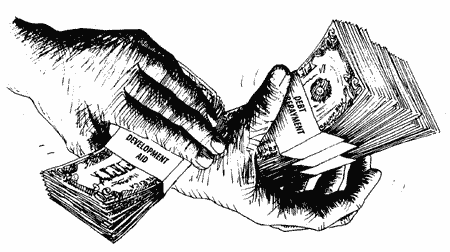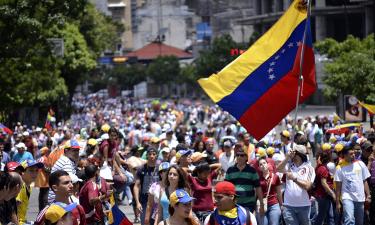Debt relief - help or hindrance?
Two months before the G8 leaders discuss debt relief for Africa, what are the issues at stake?
The basic and fundamental question at stake here is whether or not the richer nations are committed to helping Africa or to perpetuating endemic poverty, holding the continent hostage in a stranglehold which they refuse to loosen.
On 6th July, at Gleneagles in Scotland, the leaders of the eight richest nations will gather to discuss the issue of debt relief for Africa. The agenda was drawn up by British Prime Minister Tony Blair in 2004, when he formed his Commission for Africa, whose report was released on 11th March this year, in preparation for the G8 Summit.
Among other things, the report calls for a total pardon of the continent's debt, which saddles the African nations with a system of debt repayment costing a staggering fifteen billion USD per annum, money which could be better spent on social programmes.
What will the G8 decide?
There is a difference between debt relief per se, which means a total pardon of the continent's debts with no political or commercial strings attached, and a neo-colonialist approach camouflaged by a debt relief which is massively and heavily conditioned in favour of the developed nations and against the interests of the Heavily Indebted Poor Countries in Africa.
A real and complete debt relief will free the African countries from the yolk of the suffocating repayment to fat-cat financial institutions in western nations and will enable them to throw the full weight of their budgets into programmes which foster sustainable development. NEPAD, the New Partnership for Africa's Development, will ensure that a bilateral approach which stimulates accountability on one hand and responsibility on the other, can then flourish, aiding the African nations to grow as they discover new markets and become full and equal members of the international community.
What will not work is a debt relief which forces African nations to launch privatization programmes, only for their companies to be swallowed up by multi-nationals, sending hundreds of thousands of people across the continent into chronic unemployment and endemic poverty, precisely what Africa needs to avoid.
Equally disastrous would be an exchange between debt relief and a reduction in aid, because the African nations benefiting from relief would not be able to transform the capital into immediate liquid funds. They need a two-pronged approach, with an increase in aid and a cancellation of debt.
How united is the G8?
It is not united when it comes to debt relief. However commendable the effort of Tony Blair, and however careful he was to make his Commission as broad-based as possible, the plan is always the British plan and there will be other members of the G8 which will want to impose their own plans for political reasons.
John Snow, the US Treasury Secretary, gave a clear sign of what we can expect at Gleneagles only last month, when the G7 finance ministers failed to agree on exactly the same question.
George Bush's Treasury Secretary refused to agree to total debt relief for debts to the IMF.
So, while the G8 squabble and bicker about what are paltry sums when compared with their resources, Africa is saddled with debt repayments of fifteen billion dollars every year, one hundred and fifty billion dollars over ten years. Meanwhile, the number of children who die from drinking unsafe water continues to increase, the AIDS infection rate rises and the endemic and chronic problems of sub-Saharan Africa in particular are not addressed.
If the G8 does not commit itself to a total pardon of Africa's debt and a new approach to global trade, practicing what they preach in the WTO, namely a cancellation of subsidies and tariffs to keep African producers poor and western producers rich, one could conclude that with friends like the G8, who needs enemies?
Subscribe to Pravda.Ru Telegram channel, Facebook, RSS!





